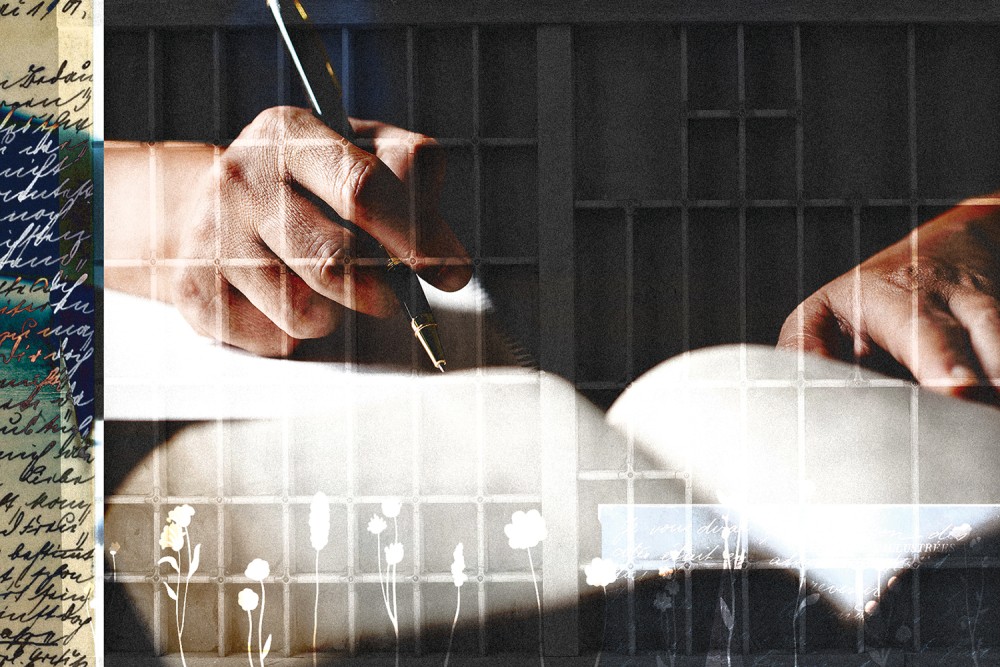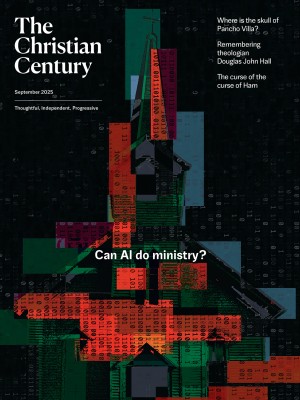
Century illustration (Source images: Getty & Creative Commons)
I was going to be a poet. Even now I want to scan that line. Headless iamb, iamb, anapest, iamb. Everything had a deeper meaning—the sun, the trees, the Friday rush hour traffic. It all pointed to something more. And I was going to find it.
I had tried Jesus. I really had: the Catholic Jesus, the Young Life Jesus, the Jesus of my evangelical college. A silent Jesus, a faraway Jesus, a Jesus of rules and limits and structure. A Jesus of sacrifice and atonement on behalf of a personal me caught with her hand in the cookie jar. A heavy Jesus I carried around, not with joy or for freedom but for the sake of being good. A Jesus of sacrificial expectations. A Jesus who exhausted me.
Read our latest issue or browse back issues.
But on Thursday afternoons, I could breathe. The advanced poetry workshop was a different kind of place, this generic beige classroom with the fluorescent lights. Here my college classmates and I oohed and aahed over a dramatic line break, a powerful turn of phrase, a quietly stunning metaphor, a precisely coordinated spark of irony. We brought our own offerings—the immature, awkward, half-baked poems we’d read aloud. There were no prerequisites, no application fees, no letters of recommendation required. Our professor, Jack Ridl, pronounced us clean before the work even began, offering the radical grace of the automatic A.
Jack sat at the front and pointed out the things we could not yet see: How brave you are to write these words. Look at what this sound does to the line. Follow this rabbit through the trail. He took us farther than we thought we could go: What if we broke the line here, rushing the reader on to the next? What if the stanza about the cat came right after the sand dunes? What if we wandered just a little longer down this simile’s lane?
Jack led the liturgy, and we feasted on the flesh of words and sounds and symbols. We smiled and said, “Welcome.” We said, “I’m so glad you’re here.” We said, “It’s like this” and “It’s like that.” We worked together to find the meaning. We pronounced the holy. We named what always was. We practiced listening deeply to the words and the meaning, to the unsaid spaces in between. Like Julian and her hazelnut, we attached ourselves to God by attaching ourselves to everything. In that generic beige room, each of us was a liturgist.
By the time I went to graduate school, I was going to be a poet. I learned rhythms and techniques, iambs and trochees and terminal spondees. I honed a critical eye, labeled the good and the bad, and wrote ten-page critiques on sonnets and villanelles. Here, too, we observed the weekly poetry workshop, but our brows were furrowed, our steps tentative. We balked at sentimentality and scowled at poetic heresies and shook our heads at the experimentalists who’d clearly gone astray. We were important. We were right. We were in pursuit of perfection. We bore the yoke of form and aesthetic as we wandered up and down the prefab rows. Joy and freedom no longer mattered; we only had to be good.
But with the millstones of rent and health insurance draped around my neck, I let poetry go. It was a frivolous and impractical exercise that would get me neither here nor there. I’m sure my parents were relieved the day I told them that I was studying to be a pastor, that I was leaving poetry behind. Compared to my dream of life as a poet, I was choosing stability, community, religion—all decent and in order. Phew. At least I’d get a pension.
So I went to seminary. I was going to be a pastor. I learned Greek and Hebrew and the Reformed tenets of Calvin and the beloved Barth. I emphasized historical criticism over reader response, exegesis over the mortal sin of eisegesis. I honed my theological eye to label the good and the bad. We perfected liturgy—the work of the people, as long as it was not messy, as long as it was not vulnerable, as long as it was not too emotional. Our brows were furrowed, our steps tentative. We scowled at the heretics and shook our fists at the dispensationalists or the supersessionists, depending what was on tap. We were gatekeepers. We were in pursuit of the attainable truth. We brought intensity, accuracy, and research. We’d figured out the meaning, and now we were ready to shepherd the masses.
Then I graduated, and life got messy. God was far away and meaning elusive. The silence persisted. But hey, at least I had health insurance. It’s funny how fundamentalism wears a variety of hats. When I found myself in precarious pastoral situations—the grandfather on his deathbed, the foreclosure, the marriage in crisis, the teenager with the clearly reasoned theological doubts and despair scrawled down his arms—I was lost. I was not cut out for this. I had no answers. Graduate school and seminary seemed to give answers to questions the world wasn’t asking.
But on my better days, I had the eyes and ears and wonder and awe of a poet. I had a semester of Jack Ridl’s advanced poetry workshop in that generic beige classroom, and memories of the ceremony of grace that met me every Thursday afternoon. I had a sacred space I could go back to again and again, where I could explore doubt and faith and questions and limits, where I could see more where I thought there was less. I walked in the shadow of a man who pointed with wonder, who said, “It’s like this” and “It’s like that” and “Now, you try.”
I also had a Jesus who wandered around the countryside and said, “It’s like this” and “It’s like that.” A Jesus who named what always was, who connected with the real and the here and the now and saw the holy in each thing. Who was the holy in each thing. Jesus the poet.
Jack told me later that he’d always wanted to go to seminary; it was where he thought he’d find meaning. “You’d never survive an argument over the color of the sanctuary carpet,” his adviser told him. “Think bigger.”
There is more church than Church. Our poetry workshop should have ordained Jack the minister of hazelnuts, pastor of the real, priest of the here and now and always. He taught me that a poet and a pastor are the same thing. We both live in this world searching for meaning. We say, look at the birds. Look at the lilies. Hold this hazelnut in your hand. There is holy everywhere, and somehow, resurrection. We invite others into this incarnated process, saying: You, too, can find it. You, too, can name it.
It’s like this. It’s like that. Now, you try.






